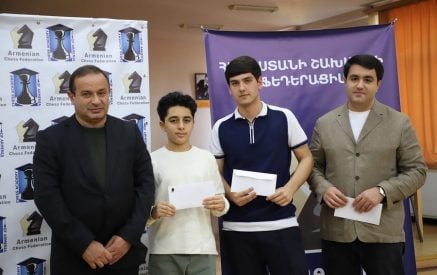EU will be firmly connected to our region
Recently, European Commission for Enlargement and European Neighborhood Policy Commissioner Stefan Füle, in the exclusive interview with “Liberty” radio station, referring to the question whether there is a solution for Armenia, or everything is over, answered,- “No, it’s not over, and we definitely have not given up Armenia and the Armenian people.” He also said that they too had the same shape as the Armenians, the decision to join the Customs Union was a shocking announcement. No less important was his precise formulation that the factor of mutual trust plays a significant role in the relations between EU and Armenia, and if faith and confidence is available, many of these things can be achieved based on it. “But now there is no trust and confidence, there is no creativity, and there is almost no desire to go forward.”
Armenia-EU relationship, despite the lack of mutual trust, will be surely continued, and a document will be signed if not in Vilnius summit, in the future. In these days, when ruling Republicans are engaged in justifying the decision of Serzh Sargsyan made on September 3 in Moscow, and continuously express an idea regarding the “security”, they would better think over the information expressed by Füle and try to analyze as to especially what “security” is needed for Armenia at this time what, the one that is supposed to be ensured by the RF, or the priorities that Armenia is an independent must approve and implement in practice.
Referring to the statement made by S. Sargsyan recently addressed to EU that before holding negotiations on Association Agreement, the EU was to persuade Turkey to open its border with Armenia, Füle had noted,- “During my previous visit to Armenia, in July, we spent a lot of time discussing the regional implications of the Association Agreement. We, the EU, have a Customs Union with Turkey, and the EU is holding negotiating on Free Trade Agreements, the existence of the Customs Union implies that Turkey must also sign a similar agreement with the same partner. And we really have discussed as to how we can use this Association Agreement and open the door of cooperation between Turkey and Armenia. But, now we probably will not know whether it would result or not.”
Read also
For the EU, in general for the West, Armenia’s Moscow decision to some extent, can be considered as a lesson. Although, the RF’s aspirations in the post-Soviet territories are not new for the EU, but in terms of the future of the Association Agreement, it became more apparent. In these conditions, the EU, perhaps, will be more firmly connected to our region, and the society of the region to the EU, because the policy that is run by the RF authorities towards the post-Soviet countries in recent times, to put it mildly, does not generate from the national interest of those countries.
In this regard, it is worth mentioning the remarkable observation of Ukrainian “Zerkalo nedeli” journalist Vassily Filipchuk that due to RF’s information-trading attacks to Ukraine, soon in the EU there will be no Ukrainian opponents joining the EU. “If once Ukraine indeed becomes a member of the EU, then it would be fully justified in granting a medal to the RF President Vladimir Vladimirovich Putin. His undeniable contribution with respect to supporting Euro integration strives by our state is difficult to underestimate,”- noted the journalist.
The statement addressed to the U.S. made by the Poland’s Deputy Foreign Minister Katarzyna Pełczyńska-Nałęcz in Washington was not accidental saying that it should have to be more involved in Eastern Europe, especially in Eastern Partnership initiatives. “We urge the U.S. that Washington undertakes not only political initiatives verbally, but also to pay high level visits to the EU’s Eastern Partnership countries ahead of the summit in Vilnius,” – said Pełczyńska-Nałęcz, urging the U.S. representatives to take part in Vilnius summit considering it very important because the future of integration of six eastern countries to the EU will be decided.
Ukraine may become the RF’s “region”, – said former United States National Security Advisor to the President Zbigniew Brzezinski recently. In an interview with Deutsche Welle, Brzezinski said that the Customs Union has more political reasons than economic,- “It is quite obvious that its essence lies in subjugating the post-Soviet countries, one after another. Ukraine, in this context, is the major “trophy”, and I think the Russians are full of determination to enslave it. In fact, the matter is whether the Ukrainians are ready to defend their independence. That’s why they, Ukrainians, have to decide whether they will again constitute a region to big Russia.” Brzezinski did not rule out the possibility that Ukraine may follow the example of Armenia.
“Ukraine, of course, is a much larger country. In some sense, it has more interconnected relationship with the RF than Armenia, which geographically, so to speak, is cut off,”- said he adding that the long-term future Ukrainian-European closer relations will lead a path for closer ties between Russia and the Europe.
And what is Moscow providing Armenia’s “security” busy with after Serzh Sargsyan’s statement in Moscow on September 3?… The “strategic ally”, so to say, delivered its regular “congratulations” to the Armenia society. The RF continues equipping the opponent of Armenia with the same intensity.
Recently, it became known that the Russian “Kurganmashzavod” has commenced the production of “Vena” self-propelled artillery systems by the order of Azerbaijan to send 18 units to Azerbaijan. “Vena” is designed to attack the opponents’ live force, artillery and mortar batteries, missile equipment, armored targets up to 13 km distance that can independently control the fire, to scout the target in daytime and at nights, accurate shooting without prior preparation to fire position.
But, in this case, as we know, there is a “crushing” counter-argument, if Russia has not sold, anyway, Azerbaijan would have bought from other countries.
Emma GABRIELYAN




























































